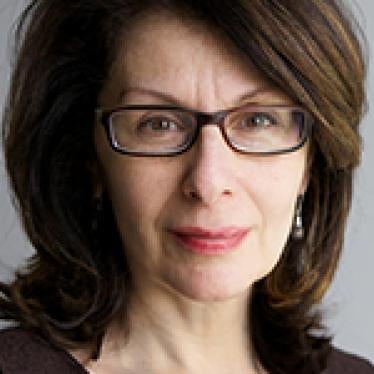(Moscow) – Vladimir Putin returned to the Russian presidency in May, and it has taken no more than 60 days to reverse the few timid positive steps on civil and political freedom that took place during the Medvedev interregnum. The ruling party is ramming a raft of laws through the Russian Parliament, setting out new restrictions on nongovernmental organizations, freedom of expression and public demonstrations.
Perhaps most striking is the law adopted by the Duma last week that would require organizations, such as civil-society groups, that accept any foreign funding to register with Russian authorities as "foreign agents." They will be burdened with additional auditing and reporting requirements, with stiff civil and criminal penalties for violations.
This contrasts with the steps Dmitry Medvedev took in 2009, when he slightly softened the Russian government's tight control over nongovernmental groups. The law's authors have said the measure is aimed at "ensuring transparency." But the term "foreign agent" in Russia has a deeply negative meaning, akin to "foreign spy." The effect would be to demonize foreign-funded groups that seek to promote change in Russia.
Meanwhile, Mr. Medvedev once promoted the Internet as crucial to Russia's economic development. But under a draft law recently introduced, Russian authorities would have the power to draw up a list of Web content that they deem harmful to children or that any court has found to be "extremist."
The host of any website found to contain such content would have 24 hours to notify the site's owner, who in turn would have 24 hours to remove the content. If the owner failed to do so, the Web host would have to block the entire site. This continues efforts that have been under way at the regional level for some time.
It is unclear which agency or bureau would compile the list of content that is considered harmful to children. Every government should protect children from harm. But the Russian authorities are known to use other laws restricting expression, particularly those on "extremism," to crack down on dissent and could use the draft law to shut down protest-group websites. Also, now that several Russian provinces and cities have adopted laws banning "homosexual propaganda"—allegedly to protect children—and a relevant federal draft law has also been proposed, Web content on gay and lesbian issues could be seriously jeopardized.
Late in the Medvedev presidency, Moscow had also loosened its de facto ban on public protests by the political opposition. The massive, peaceful protests that followed Russia's December parliamentary election led many to hope that full freedom of assembly might be restored.
But last month President Putin signed new amendments into law that dramatically increase the fines for violating rules on holding public events and impose various other restrictions that make it more difficult and costly for those opposed to government policies to engage in public protests. Some of the fines were increased 300-fold, to a staggering amount compared to the average Russian income.
And just last week, the Duma adopted a law recriminalizing certain kinds of libel. Only seven months earlier, legislation initiated by Mr. Medvedev's Kremlin had decriminalized libel, winning Moscow accolades from the Council of Europe for bringing Russian law in line with European standards.
The law restricting public demonstrations was adopted with extraordinary speed, and the laws on nongovernmental organizations and libel similarly sailed through the Duma and are expected to be endorsed by the Federation Council, the upper house of Russia's parliament, just as easily.
Officials have justified these new restrictions by claiming they are no different from Western regulations and practices. In the case of the NGO law, this is utterly false. Criminal libel remains on the books of some Council of Europe states, but is almost never applied (except in such countries as Azerbaijan). Even fewer states have recriminalized it.
As for Russia's laws regulating demonstrations, they are significantly tougher than those in Germany and the U.K. And while French law does allow for the imposition of rather stiff penalties for violating its public-demonstration regulations, French authorities almost never punish people for holding peaceful, unsanctioned rallies.
Have Mr. Putin's first 60 days been only the beginning of a new wave of repression? It's hard to know. Past experience shows that the Russian authorities apply these kinds of laws selectively to crack down on inconvenient voices that criticize policy, advocate for justice or fight corruption. Such laws also serve as a signal from the Kremlin to local officials at all levels that "anything goes."
Russia's international partners should take a firm stand against the laws designed to close the space for civil society, and make clear that Moscow's place in the international arena very much depends on its human-rights record.







